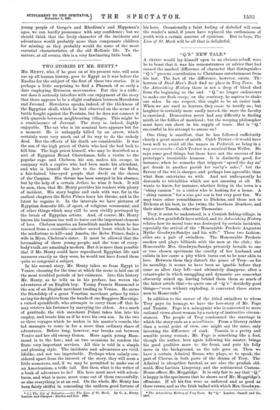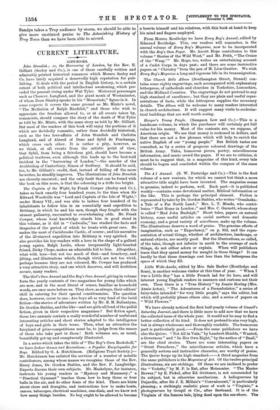" Q.'S " NEW TALE.*
A CRITIC would lay himself open to an obvious rebuff, were he to boast that it was his remonstrances or advice that bad caused the marked difference of character that distinguishes " Q.'s " present contribution to Christmas entertainment from his last. The fact of the difference, however, exists. Th., horrors of Dead Man's Rock find no place in Troy Town. In the Astonishing History there is not a drop of blood shed from the beginning to the end. " Q." no longer endeavours to make our flesh creep ; on the contrary, he aspires to shake our sides. In one respect, this ought to be an easier task. When we are used to horrors, they cease to terrify us ; but laughter is certainly more easily moved, the more the faculty is exercised. Democritus never had any difficulty in finding mirth at the follies of manhood ; but the weeping philosopher must have run short in his supply of tears. But is " Q." successful in his attempt to amuse us?
One thing is manifest, that he has followed sufficiently closely a great master of mirth. Caleb Trotter—it would have been well to avoid all the names in Pickwick, as being in a way sacrosancta—Caleb Trotter is a nautical Sam Weller. He says some good things, but these have not the success of his prototype's irresistible humour. It is distinctly good, for instance, when he remarks that trippers " spend the day an' get drunk in another parish for var'ty's sake ;" but the flavour of the wit is sharper, and perhaps less agreeable, than what Sam entertains us with. And not unfrequently he descends to trivialities which are not amusing at all. He wants to know, for instance, whether living in the town is a " shiny cannon " to a visitor who is looking for a house. A " shiny cannon" for a sine qud non is but very poor fun. We may trace other resemblances to Dickens, and those not to Dickens at his best, in the twins, the brothers Dearlove, and their sister Tamsin, otherwise Thomasine.
Troy, it must be understood, is a Cornish fishing-village, in which a few gentlefolk have settled, and its Astonishing History relates how its moral tone was destroyed by certain incidents, especially the arrival of the " Honourable Frederic Augustus Hythe Goodwyn-Sandys and his wife." These two fashion- ables are a pair of swindlers. The Honourable Frederic smokes and plays billiards with the men at the club ; the Honourable Mrs. Goodwyn-Sandys privately bewails to one or two chosen specimens the cruelty of her husband, and enlists in her cause a pity which turns out to be near akin to love. Between them they disturb the peace of Troy—as for its morality, it seems to have been as ignoble before they came as after they left—and ultimately disappear, after a catastrophe in which smuggling and dynamite are somewhat obscurely mixed up, leaving behind them them so much of the latter article that—to quote one of " Q.'s " decidedly good things—" even without exploding, it converted three states- men to Home-rule."
In addition to the career of the titled swindlers to whom Troy pays its homage, we have the love•story of Mr. Fogo and Tamsin. Fogo is a misogynist who is converted to more rational views about woman by a variety of instructive circum- stances. The people of Troy condemned the marriage in which the story ends as a rnesalliance. From a literary rather than a social point of view, one might say the same, only inverting the difference of rank. Tamsin is a pretty and sensible young woman; Mr. Fogo is something like a fool, though the author, here again following his master, brings his good qualities more to the front, and puts his folly more in the background, as the tale goes on. Then we have a certain Admiral Buzza, who plays, so to speak, the part of Chorus, in both parts of the drama of Troy. The Admiral is altogether farcical, as are also the prudish old- maid, Miss Lavinia Limpenny, and the sentimental Custom- House officer, Mr. Moggridge. It is only fair to say that " Q." is happy in the specimens that he shows us of Mr. Moggridge's effusions. If all his fun were as unforced and as good as these verses, and as the Irish ballad with which Mrs. Goodwyn-
• The Astonishing History of Troy Town. By "Q." London: Naga and Co. 18t6.
Sandys takes a Troy audience by storm, we should be able to give more unstinted praise to The Astonishing History of Troy Town than we have been able to accord.



















































 Previous page
Previous page